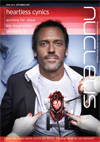Autumn may seem a strange time to publish a piece on 'cynicism'. Medical school lecture theatres are full to bursting in those early days when freshers attend absolutely every lecture without fail; the wards are covered in students with shiny new stethoscopes seeking their first patients to clerk, and FY1s are delighting in the first pay cheque received the month before.
Contrast this with January. Spare seats in lectures when freshers decide that bed is more inviting than a 45 minute journey to hear yet more incomprehensible immunology; frustrated clinical students having the third coffee of the day when yet another emergency leads to cancelled teaching; jaded FY1s having worked both Christmas and New Year because of inflexible rotas already planning an escape to Australia after FY2.
The transition from bright-eyed and enthusiastic new student to hardened cynic happens fast - and is rarely noticed because everyone around us is doing the same.
It is not just medicine that makes us cynical. Just since the last edition of Nucleus, we've seen further moves to try and legalise assisted suicide, worsening persecution of Christians in the Middle East, and continued conflict in many other places. Does anything we do really make any difference when things continue to go wrong? Giles Cattermole's article on our beliefs (page 6) reminds us that in a world where all are fallen and sinful, we should not be surprised at problems.
Sometimes cynicism is best cured by reading about an inspiring individual; heroes + heretics introduces Corrie ten Boom, a Dutch evangelist with an inspirational story (page 32). Stories from overseas such as Sarah Tresidder's recent trip to Albania (page 9) can also inspire us and blow away the cobwebs of cynicism.
At other times cynicism is dispelled by the manner in which we approach our work. Studying and working for Jesus (page 20) shows how things might look when we seek to do everything 'as working for the Lord'; our values (page 10) further explores how we can treat patients as he would, this time in the area of equality. Light relief can also help - and the cross-word is to be found on page 35.
Surely the ultimate antidote to cynicism must be to consider again the central truths of our faith. Christian, what do you believe? (page 4)uses the ancient Apostles' Creed to remind us of the amazing truth of the gospel, stunningly displayed in the death and resurrection of Jesus. Chris Knight (page 14) helps us to think about how we might argue for the historical reality of the resurrection to friends.
Alex Bunn's article on cynicism (page 25) draws together all these things; as well as diagnosing cynicism, it offers an urgent prescription not only for treatment, but even better for prevention: 'Jesus' light has overcome the darkness, and the future is bright.'
































